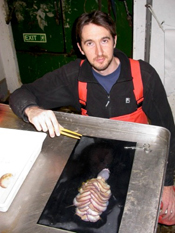Dr Adrian Glover
Investigating deep-sea life up close has led our marine biodiversity expert to explore the Antarctic Ocean and to discover new species where they were least expected.

Early aspirations
Seeing the diversity of the underwater world up close inspired Dr Glover to study the ocean. He learnt to scuba dive in his teens and with this skill he investigated tropical coral reefs in the Red Sea for his undergraduate thesis.
Oceanography wasn't a childhood ambition, but an interest that grew, and hasn't stopped growing. There are still many new discoveries to be found, particularly in his research area, the deep sea.
Although it seems like a place that's difficult to reach, Dr Glover says it is important for the science to see the deep sea up close. This adventure is becoming more possible with remotely operated vehicles, mini robot submersibles that can operate thousands of metres below a ship.
Super specimens
Dr Glover explores the remotest oceans in the world, including the 'last remaining wilderness' of the deep Antarctic. 'It has the most remarkable contrast between what lives on the Antarctic land, which is extremely minimal, and the diversity and richness of the Southern ocean,' he says
He doesn't always have to travel to remote locations for surprising new finds, however. One new species Dr Glover and colleagues described, Osedax mucofloris (‘bone-eating snot-flower worm’), was found living on the bones of dead whales in shallow water near a marine biology lab that had been sampling the area for hundreds of years.
‘Finding new and undocumented species so close to places that have been so well researched is really exciting and interesting,’ he says. ‘It opens people’s minds to what they haven’t thought about before.’
Preserving life
Dr Glover has found many weird and wonderful organisms living in remote spots in the ocean, but one of the biggest remaining mysteries is how these animals disperse across vast distances of the ocean floor, an area that covers 60 per cent of our planet, and set up in isolated locations such as chance whale skeletons.
A network of sample points on the ocean floor and new genetic data may help solve this question, but, as with his other deep-sea missions, it would require international collaboration and a lot of ingenuity.
‘Science is a much more diverse activity than you might think. You need specialist knowledge, but an extremely broad range of skills.’